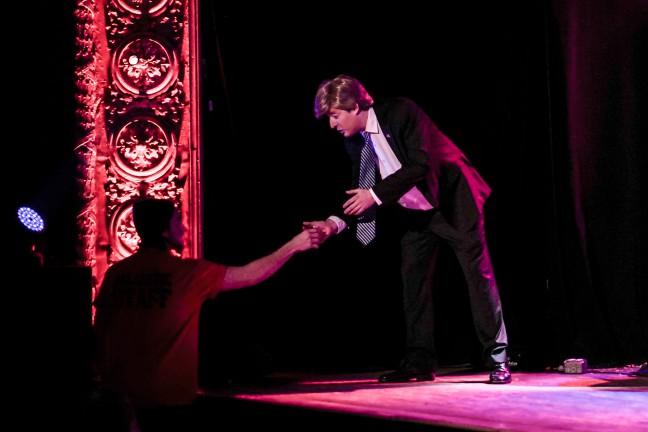How does a societal perception manifest itself? Time? Frequency of exposure? Relevance? What about entertainment value?
Certainly the more gripping the idea or event the more it will circulate. And the more it circulates, the more it attention it will grab at its mention. At face value, this seems ideal in the sense the more eyes and ears you reach, the more we as a society can discuss an issue.
Disappointingly, it’s not that simple. Instead, entertainment value can become a guiding force — manipulating and sensationalizing current events until the truth is indecipherable. Moreover, increased viewership results in increased spectrum of opinions to the point where having a coherent societal discussion is nearly impossible.
The Whoa Show delivers a new kind of comedy to Broom Street Theater
I’ll admit this is a bleak outlook on our ability as a human race to reach productive conclusions. But I’d argue it’s possible for one thing to unite people with differing views, as well as simplify complex social and political issues.
At this point you’re thinking one of two things: A. That I’m perched on a cloud, blissfully ignorant and idealistic, or B. you’re on the edge of your seat eager to hear the solution to our problems as a society. If you’re an A person, allow me to finish, and if you’re a B person, I don’t have all the answers but I sure hope to make you think more critically.
This secret serum for societal clarity is comedy.
Laughter is contagious, yes, but that’s not my focus. Laughter, especially as it relates to social issues, tends to morph into faux entitlement, which morphs into bigotry, which accomplishes nothing. Neither am I suggesting all comedians are responsible enough to construct comedic social commentary that doesn’t come across as belittling. Rather, I’m focused on discussing the power of comedy to knife through the noise highlighted by overanalysis, and rediscover the core of an issue. Historically, social commentary has been at the core of comedians’ material, and as such it’s pertinent now more than ever to recognize the legitimacy of a comedian’s ability to influence social consensus.
Michael Che, co-host of Saturday Night Live’s Weekend Update and talented stand-up comedian, recently released a comedy special on Netflix. About halfway through his act, once he had the audience warmed up to his style, Che introduced his next topic, the Black Lives Matter movement. His joke lasts for around three minutes and characterizes my previous contention beautifully.
Che first discusses how, as a country, we can’t agree on much, emphasizing the fact we always seem to be in conflict. Building off that, he points out the absurdity of disagreeing with the movement, hinging on the fact that, by definition, the movement says “black lives matter,” period. Not more than another race, just that they matter. He goes on to discuss how confusing it is that such a stance is considered controversial, wondering if he can even claim “black lives exist” without facing problems of controversy.
What a Joke Comedy Festival: Comedic protest in the face of human rights threats
To wrap it up he does something truly beautiful, he takes an issue as complex, nuanced and historically significant as equal rights movements, and disassembles any form of backlash by saying “Can you believe that’s an actual stance you can have? You can be for equal rights? That means there’s people out there saying, ‘I think everybody should have the same rights as everyone else.’ And there’re other people who are like, ‘Nah, son, I disagree.’”
He’s pointed out the absurdity of denying people rights not by pointing out how ridiculous it is to be against equal rights, but by showcasing how ridiculous it is that people have to fight to support equal rights at all.
I won’t pretend comedy it’s a perfect forum for discussion and the sharing of ideas, because it’s far from it, as many comedians cross the line into mockery and belittling of serious issues, but, overall, it has its merits. Comedy, traditionally, is designed to be an escape from the toils of everyday life, but the likes of Louis C.K., Michael Che, Trevor Noah, Jon Stewart and a multitude of others have hybridized the informal environment, and used it to get people to think critically of our society through laughter.
This is a powerful tool that warrants significant responsibility, so as not to enable disrespect disguised as humor. But if used responsibly, comedy can be an important influence on our social perceptions.
Take the 2016 election for example, comedians took advantage of a scandal-laden and polarizing election by uncovering truths through informal means. Specifically, The Daily Show with Trevor Noah frequently sent one of their correspondents, Jordan Klepper, to rallies for Donald Trump to interview supporters.
What made this idea intriguing and impactful was that Klepper was there to test an immigration tactic Trump supports — “extreme vetting” of refugees and immigrants. The humor was centered around contradictions in Trump supporters’ claims on American values and their devout support for the policy. This video went viral across social media forums and eventually became an informative piece of political advertising for the Democratic Party and featured on multiple Democratic social media accounts.
This evolution from traditional jokes to social discourse makes comedy impactful and provides an informal and, at times, comfortable lens through which political and social issues can be addressed. Drawing the line between objectively offensive and stimulating is dicy and does not have a finite answer. Rather, recognizing the potential for comedy to be more than just humorous is valuable.














